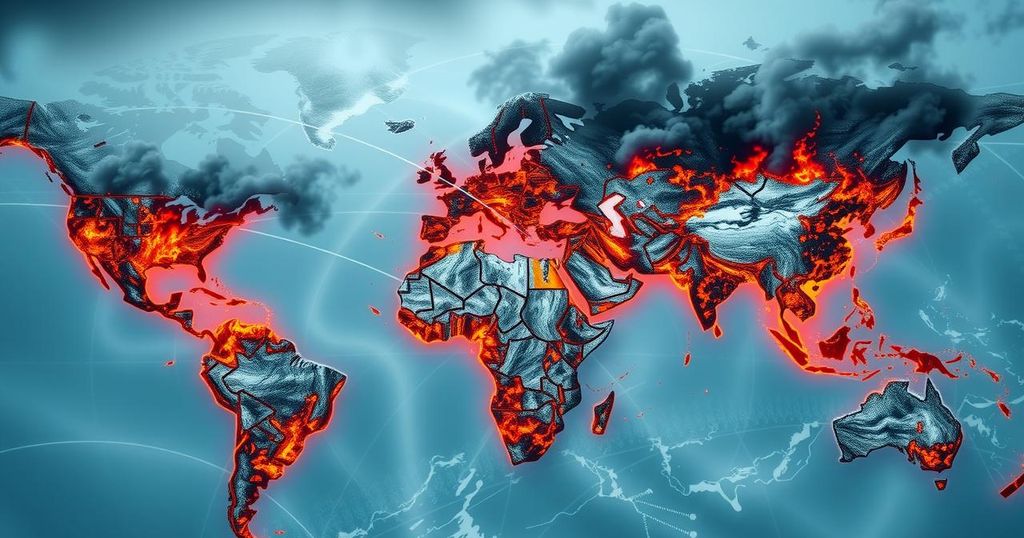This article outlines the ongoing humanitarian crises in Gaza, Syria, Ukraine, and Mozambique, emphasizing civilian suffering due to conflict and natural disasters, with a focus on restricted aid access, dire living conditions, and the urgent need for humanitarian support in these regions.
Recent reports highlight the severe humanitarian crises unfolding in the Occupied Palestinian Territory, Syria, Ukraine, and Mozambique following Tropical Cyclone Chido. In Gaza, ongoing hostilities have resulted in significant civilian casualties and infrastructure destruction, exacerbating the humanitarian crisis as aid access continues to be hindered. In north-west Syria, over 730,000 displaced individuals face dire conditions in camps that have been affected by adverse weather. Meanwhile, in Ukraine, recent large-scale attacks on energy infrastructure have left hundreds of thousands without heat and electricity during winter. Lastly, Mozambique is grappling with the aftermath of Cyclone Chido, which has resulted in extensive flooding and damage to agricultural land, affecting food security for many families.
In Gaza, the situation remains alarming with continuous reports of civilian deaths and injuries due to ongoing attacks. Aid organizations face significant challenges in delivering humanitarian aid, evidenced by the denial of many UN aid requests. The inflated prices of basic food items have rendered immense portions of the population vulnerable to food insecurity, particularly in regions such as Deir al Balah, Khan Younis, and Rafah.
The humanitarian crisis in north-west Syria is marked by harsh winter conditions affecting displaced populations living in tents. Flooding has caused substantial destruction of shelters, aggravating the plight of families wishing to return to their homes but hindered by the lack of infrastructure, explosive remnants, and minefields. Persistent violence, including landmine incidents, contributes to the ongoing dangers faced by returning populations.
In Ukraine, the Humanitarian Coordinator condemned the recent attacks that negatively impacted the energy supply and left many without basic necessities during the holiday season. This was part of a troubling pattern of assaults on energy infrastructure, highlighting the vulnerabilities of civilians amid winter. Humanitarian efforts are urgently required to address the catastrophic conditions resulting from these attacks.
Lastly, Mozambique’s recent experience with Tropical Cyclone Chido has led to over 77,000 individuals receiving humanitarian assistance. Flooding has devastated massive agricultural land, raising concerns over food security, particularly in the northern provinces of Cabo Delgado, Nampula, and Niassa. The international and local humanitarian response continues to mobilize to support affected populations.
The article discusses ongoing humanitarian crises in four specific regions: the Occupied Palestinian Territory, Syria, Ukraine, and Mozambique. In Gaza, the persistent conflict has had catastrophic effects on civilian lives and infrastructure. Similarly, in north-west Syria, extreme weather and previous conflicts have left many in precarious living conditions. Ukraine faces assaults on crucial energy infrastructure, worsening the humanitarian situation as winter approaches. In Mozambique, Cyclone Chido has compounded existing vulnerabilities related to food security in the region. Understanding these crises requires awareness of the ongoing violence, weather-related challenges, and the international humanitarian response to assist affected populations.
These concurrent humanitarian crises in the Occupied Palestinian Territory, Syria, Ukraine, and Mozambique emphasize the urgent need for international intervention and support. Each region grapples with profound challenges that disproportionately affect the most vulnerable communities, highlighting the importance of sustained humanitarian efforts and accessibility of aid for those in dire circumstances. Collectively, these situations provide a stark reminder of the global challenges faced in delivering assistance amid conflict and natural disasters.
Original Source: www.unocha.org






